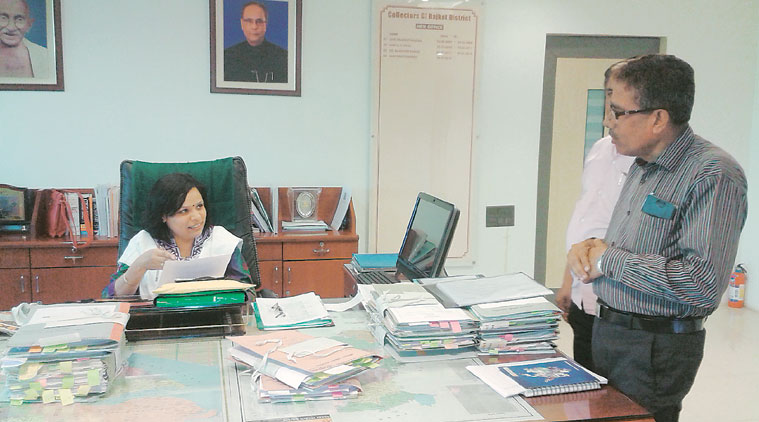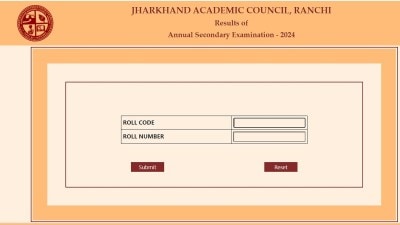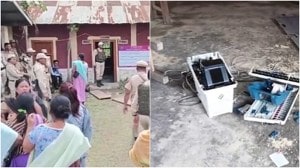- India
- International
Catching the flu
Keeping a close watch on the number of new cases of swine flu has been a daily routine for Chandra since early February when the first H1N1 infection was reported in Rajkot.
 News of Sonam Kapoor’s infection has given a bad name to Rajkot, rues Chandra. (Source: Express photo by Gopal Kateshiya)
News of Sonam Kapoor’s infection has given a bad name to Rajkot, rues Chandra. (Source: Express photo by Gopal Kateshiya)
A day in the life of Manisha Chandra, 37, District Collector, Rajkot
In between hearing revenue cases and receiving invitations for amusement parks, Rajput District Collector Manisha Chandra keeps a tab on swine flu statistics in her district.
It’s 10 am and Manisha Chandra, the 37-year-old district collector of Rajkot, is still an hour away from work. She has just finished her puja after a hectic early morning schedule — a brisk walk, a yoga session, readying her five-year-old for school — when her phone beeps. It’s a WhatsApp message from the chief district health officer (CDHO), Dr Vijay Pathak, updating her about the latest on swine flue in Rajkot district: 122 total cases, 16 deaths with no casualties in the past 12 hours.
The numbers are twice what they were on February 20 — 54 cases and 10 deaths — when Chandra had invoked Section 144 of the CrPC, prohibiting mass gatherings and public functions without prior permission. “But”, says Chandra, “Rajkot is way behind other cities in Gujarat in swine flu statistics.” Of the 1,198 swine flue deaths in India, Gujarat tops the list with 292. Ahmedabad, with 1,133 positive cases and 87 deaths, has the worst figures. Rajkot ranks seventh among the worst-affected districts of the state.
Chandra blames the news of Sonam Kapoor being detected with swine flu in the city for “the negative image of Rajkot”. “Her trainer had tested positive in Mumbai. Ideally, she should have been checked there and given Tamiflu. Instead, she flew to Rajkot and went to Gondal town in our district for shooting. This gave the virus enough time for incubation. The media and senior officers from state government went after us after she was hospitalised,” she says.

Keeping a close watch on the number of new cases of swine flu has been a daily routine for Chandra since early February when the first H1N1 infection was reported in Rajkot. At 11 am, when she begins work at her office on Shroff Road, one of the first things she does is speak on the phone with the regional deputy director of health (RDD), Dr Rupali Mehta, and the CDHO for an update on new cases — which locality have they been reported from, if family members of new victims have been screened, etc.
“Now that the situation is under control, we’ve come down to phone calls. Earlier, we’d have meetings on the issue,” she says. It was at one such meeting on February 20 that the decision to impose Sec 144 was taken, though “the numbers didn’t really warrant it”. But because Rajkot is the headquarters of Saurashtra, “the city’s health facilities cater to the entire region and whatever happens here catches attention”. “Besides, Rajkot has a tradition of fairs and festivals. On Race Course ground, some type of fair or festival is always on. Through the prohibitory orders, we want to raise awareness among the public about swine flu,” explains the 2004-batch IAS officer. The prohibitory orders will remain in force till April 19.
The notification, she says, was particularly useful in rural areas and small towns where awareness is low. In villages, pamphlets on how to prevent or look for early signs of the infection were distributed, while hoardings were put up in cities. The chief secretary of the state or health commissioner discusses progress reports through video conferences.
“We conducted door-to-door surveys in Gondal and Jetpur, towns from where a majority of cases have been reported. Those with symptoms were tested for swine flu at government centres and those found infected were treated free of cost,” Chandra says, adding that the notification is not meant to create panic, and that no advisory has been issued to schools to declare vacations. “My daughter caught a cold in early February. I did not send her to school for a week, not only for the sake of her health but also of other students. I would like other parents to do the same,” Chandra advises.
She exercises caution at her office too. Peons and clerks have been instructed to look for any visitor sneezing or coughing and ask him/her to either wear a mask or cover the mouths with a handkerchief before entering any chamber. However, they are not given a mask or a hanky if they don’t have one. The staff, too, has been asked to wash their hands more frequently. “I sanitise my hands frequently. The entire office is sanitised with quinine twice a day,” says the collector.
At 2.30 pm, when she returns to work after lunch, a group of 40 persons is in the waiting lounge. They have come for hearing of revenue cases. None is wearing a mask. Nor is Chandra. Before proceedings begin, A M Vasavda, a deputy mamlatdar, comes in with a few papers from the Rajkot Bar Association.
The collector examines them carefully, and says with a sigh, “So, they don’t want hearings till March 9?” At an urgent meeting of its executive committee, the Bar Association of Rajkot had resolved to remain away from court work in view of the prevalent swine flu situation in the district. The Bar requested the collector not to mark advocates who skip hearings till March 9 absent.
The collector, who has judicial powers, now begins to hear the cases, mostly related to land disputes. Swine flu is now off her mind.
After she finishes hearing cases, which last till about 4 pm, representatives of a newly opened amusement park walk in and invite her to visit their park. They are followed by officials of an emergency service who invite her for the launch of a women’s helpline.
Around 5 pm, it’s swine flu time again. Her smartphone beeps with a text message from Dr Mehta, informing her that only five samples have tested positive for H1N1 virus, with no death. Chandra heaves a sigh of relief and instead of her routine practice of calling Dr Mehta to discuss the results, she pushes the button of her office bell. A group of agitating Dalits has come from Kotharia, a village recently merged into Rajkot city, with a demand to allot them residential plots. Chandra assures them she would consider it.
The next two hours are spent in routine meetings with subordinates. At 8 pm, she goes through two bunches of letters — one has government letters, circulars and resolutions, the other is from the public with suggestions and grievances. “I want to go home at 7 pm. But these letters cannot be ignored,” says Chandra, wrapping up her work by 9 pm.
Apr 19: Latest News
- 01
- 02
- 03
- 04
- 05






































